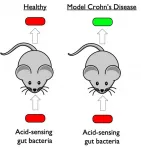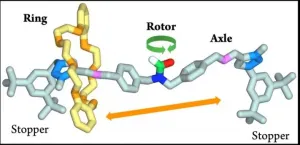(Press-News.org) Taking medications to protect the heart from damage associated with adjuvant breast cancer therapy--medications that are administered in addition to surgery to remove a tumor--did not significantly improve markers of heart health two years after breast cancer treatment, according to a study presented at the American College of Cardiology's 70th Annual Scientific Session.
The researchers reported no significant differences between patients who took an angiotensin receptor blocker (candesartan cilexetil) or a beta-blocker (metoprolol succinate) compared with placebos in terms of left ventricular ejection fraction (LVEF), a measure of the heart's ability to effectively pump blood and the trial's primary endpoint. The study, which included a broad population of patients who were undergoing treatment for breast cancer, suggests many patients face a low risk of heart damage from contemporary adjuvant therapy and do not benefit from routinely administered cardioprotective drugs during chemotherapy, according to the researchers.
"If patients don't have preexisting heart conditions or high cardiovascular risks from the start--for example, hypertension or diabetes--it seems to be relatively safe to administer adjuvant therapy," said Siri Lagethon Heck, MD, PhD, a cardiovascular radiologist at Akershus University Hospital, Lørenskog, Norway, and the study's lead author. "In this patient group, the therapy isn't as dangerous as previously thought, and in general, patients should not be afraid that their cancer therapy will harm their heart."
Previous studies have identified heart failure, which weakens the heart's ability to pump blood, as a potential side effect of anthracyclines and monoclonal antibodies like trastuzumab. About 30% of patients with breast cancer receive anthracycline-containing chemotherapy after surgery. However, it has been unclear whether cardioprotective drugs can help patients avoid treatment-related heart damage or which patients would be most likely to benefit from this preventive treatment.
For the trial, called Prevention of Cardiac Dysfunction During Adjuvant Breast Cancer Therapy (PRADA), the researchers enrolled 120 patients with early-stage breast cancer and randomly assigned the patients to take candesartan cilexetil (commonly used to treat high blood pressure and heart failure), metoprolol succinate (commonly used for the treatment of high blood pressure, after a heart attack or for heart failure), both drugs or only placebos during their breast cancer treatment. Neither the patients nor the doctors involved in the study were aware of which combination of drugs or placebos each patient received. At the start of the study and after a median of 23 months, patients underwent a cardiac MRI to assess their heart function. Overall, patients experienced only a slight reduction in LVEF--less than 2 percentage points in all groups--and there were no significant differences between groups.
Based on the findings, researchers said prescribing heart-protective medications during adjuvant therapy is likely not warranted in most cases for patients without preexisting cardiovascular risk factors.
"Cardioprotective treatment with these drugs may give the patients side effects and should not be given routinely when it's not needed," Heck said.
The researchers found no significant differences in the secondary outcome change in concentrations of troponin I and T, markers of injury to the heart muscle.
Researchers said patients who already have heart disease or related risk factors likely face the greatest risk of heart damage from adjuvant therapy. To advance efforts to prevent heart failure in these patients, the researchers are now conducting a separate, multicenter trial to test the heart failure medication sacubitril/valsartan in more high-risk patients. They are also further analyzing data from the PRADA trial to determine factors that may increase a person's risk for heart damage.
"We want to try to identify the patients who are at higher risk for heart problems and who might benefit more from cardioprotective drugs," Heck said. "With this information, we can really put the effort where the help is needed."
The study was conducted in a single medical center, saw less of a decline in ejection fraction than anticipated and may have lacked the statistical power to detect very minor differences in heart function; however, such small differences are unlikely to be clinically important. The testing of two drugs in one trial and the fact that patients were followed from before their cancer therapy until more than a year after discontinuation of adjuvant therapy and study drugs represent key strengths, Heck said.
INFORMATION:
This study was simultaneously published online in the journal Circulation at the time of presentation. The study was funded by the Norwegian Cancer Society, the University of Oslo and regional health authorities. The medication used in the trial was provided by AstraZeneca.
Heck will be available to the media in a virtual press conference on Sunday, May 16, at 9:45 a.m. ET / 13:45 UTC.
Heck will present the study, "Prevention of Cardiac Dysfunction During Adjuvant Breast Cancer Therapy (PRADA): Long-term Follow-up Of A 2 X 2 Factorial, Randomized, Placebo-controlled, Double-blind Clinical Trial of Candesartan and Metoprolol," on Sunday, May 16, at 8 a.m. ET / 12:00 UTC, virtually.
ACC.21 will take place May 15-17 virtually, bringing together cardiologists and cardiovascular specialists from around the world to share the newest discoveries in treatment and prevention. Follow @ACCinTouch, @ACCMediaCenter and #ACC21 for the latest news from the meeting.
The American College of Cardiology envisions a world where innovation and knowledge optimize cardiovascular care and outcomes. As the professional home for the entire cardiovascular care team, the mission of the College and its 54,000 members is to transform cardiovascular care and to improve heart health. The ACC bestows credentials upon cardiovascular professionals who meet stringent qualifications and leads in the formation of health policy, standards and guidelines. The College also provides professional medical education, disseminates cardiovascular research through its world-renowned JACC Journals, operates national registries to measure and improve care, and offers cardiovascular accreditation to hospitals and institutions. For more, visit ACC.org.
Media Contacts
Nicole Napoli
202-669-1465
nnapoli@acc.org
Thy-Ann Nguyen
703-479-3642
thyann.nguyen@curastrategies.com
Rivaroxaban, in addition to low-dose aspirin, significantly reduced the occurrence of total severe events of the heart, limb or brain and issues related to other vascular complications in patients with symptomatic peripheral artery disease (PAD) who underwent lower extremity revascularization, a procedure to open blocked arteries in the leg. The findings, presented at the American College of Cardiology's 70th Annual Scientific Session, expand on earlier data and underscore the broad absolute benefits of this strategy in this high-risk patient population, researchers said.
"To our knowledge, this is the first time that the addition of low-dose rivaroxaban to aspirin has been clearly shown to reduce ...
In patients who had a coronary stent inserted after experiencing the most severe type of heart attack, the use of a technique that measures blood flow and pressure through a partially blocked artery to determine if a second stenting procedure is needed did not improve outcomes and was more costly than using angiography, or a heart X-ray, alone to guide the procedure, according to research presented at the American College of Cardiology's 70th Annual Scientific Session.
"The strategy of using fractional flow reserve (FFR) to guide the stenting procedure is not superior to the standard technique of using angiography to treat additional partially blocked arteries," said Etienne Puymirat, MD, professor of cardiology at the University of Paris, director of intensive care at the Georges ...
HOUSTON - (May 17, 2021) - In an important step toward the clinical application of synthetic biology, Rice University researchers have engineered a bacterium with the necessary capabilities for diagnosing a human disease.
The engineered strain of the gut bacteria E. coli senses pH and glows when it encounters acidosis, an acidic condition that often occurs during flareups of inflammatory bowel diseases like colitis, ileitis and Crohn's disease.
Researchers at the University of Colorado (CU) School of Medicine used the Rice-created organism in a mouse model of Crohn's disease to show acidosis activates a signature set of genes. The corresponding ...
Humans leave their "footprints" on the land area all around the globe. These land-use changes play an important role for nutrition, climate, and biodiversity. Scientists at the Karlsruhe Institute of Technology (KIT) combined satellite data with statistics from the past 60 years and found that global land-use changes affect about 32 percent of the land area. This means that they are about four times as extensive as previously estimated. The researchers publish their findings in the scientific journal Nature Communications.
Whether it is deforestation, urban growth, agricultural expansion, or reforestation - land-use changes are diverse and have ...
Researchers from Tohoku University have developed a new numerical method that paves the way for simulating landslide tsunamis.
Their research was published in the journal Computational Mechanics on May 13, 2021.
Landslides occurring on land or underneath the sea - known as subaerial and submarine landslides respectively - can cause devastating tsunamis. They also pose other hazards such as severing submarine cables and pipelines.
Yet the mechanisms at play behind these landslides are less well understood, partly due to the multifaceted interactions taking place: a collapse of the seabed and/or the interaction between soil and water. Conventional approaches make it difficult to ...
Clinics that mailed mifepristone and misoprostol tablets to patients during the pandemic have experienced a high demand and have been able to safely screen and care for patients via telehealth, according to two studies recently published online in the journal Contraception.
The first study identifies factors that supported the provision of abortion pills across four healthcare settings. Factors that contributed to success included clinic staff helping to organize the telehealth appointment and to distribute pills, the first paper noted, as well as already having telehealth ...
Doctors often recommend Omega-3s to help patients lower their cholesterol and improve heart health. Those Omega-3s can come from fatty fish like salmon and mackerel, or supplements that often contain a combination of the acids eicosapentaenoic acid (EPA) and docosahexaenoic acid (DHA).
Now, new research from the Intermountain Healthcare Heart Institute in Salt Lake City finds that higher EPA blood levels alone lowered the risk of major cardiac events and death in patients, while DHA blunted the cardiovascular benefits of EPA. Higher DHA levels at any level of EPA, worsened health outcomes.
Results of the Intermountain study, which examined nearly 1,000 patients over a 10-year-period, will be presented virtually at the ...
Gears and mechanical transmissions are at home in the Emilia-Romagna region, the Motor Valley of northern Italy. A team of researchers from the University of Bologna and the Institute for Organic Synthesis and Photoreactivity of the National Research Council (Cnr-Isof) in Bologna, led by Massimo Baroncini and Alberto Credi, has planned, constructed and operated NanoGear, a device consisting of interlocked molecular components and designed to function as a gear. Since molecules are nanometric objects (1 nanometer = 1 millionth of a millimetre), it is an exceedingly small device: certainly, ...
DALLAS, May 17, 2021 -- Detecting a critical heart defect before birth (congenital heart defects) is less likely when a mother lives in a rural area, lives in a neighborhood with low socioeconomic status or is Hispanic, according to new research published today in the American Heart Association's flagship journal Circulation.
Diagnosing a heart defect before birth reduces infant death rates, increases access to prompt medical treatment, improves neurodevelopmental outcomes and decreases the risk of brain injury for the infant after birth.
"The benefits of prenatal diagnosis for heart defects have been recognized for years, yet prenatal detection occurs in less than 60% of congenital heart disease cases in many U.S. ...
A valve invented by engineer Nikola Tesla a century ago is not only more functional than previously realized, but also has other potential applications today, a team of researchers has found after conducting a series of experiments on replications of the early 20th-century design.
Its findings, reported in the journal Nature Communications, suggest that Tesla's device, which he called a "valvular conduit," could harness the vibrations in engines and other machinery to pump fuel, coolants, lubricants, and other gases and liquids.
Now known as the Tesla Valve, the patented device has inspired strategies for ...




